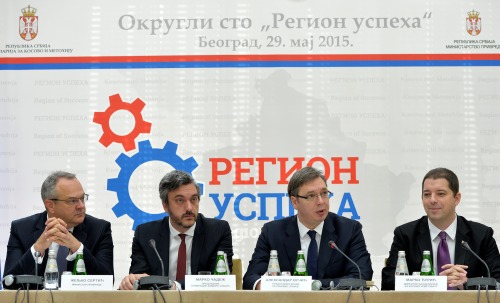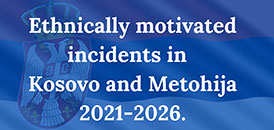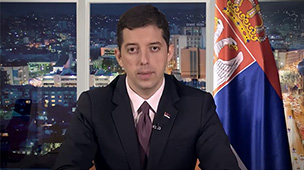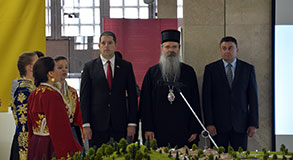Vučić Invites Businesses from Central Serbia to Invest in Kosovo and Metohija
Serbian Prime Minister Aleksandar Vučić has invited businesspeople to invest in Kosovo and Metohija, and announced that the State would provide considerable benefits in terms of taxes and contributions for all those who invest in this part of Serbia.

At the Region of Success round table jointly organised by the Office for Kosovo and Metohija, the Ministry of Justice and the Chamber of Commerce and Industry of Serbia, Vučić said that a powerful economy is a state policy and that a state's strength is reflected in the strength of its economy.
“We have taken determined action and accomplished results which allow us to earmark some funds to subsidise new jobs in Kosovo and Metohija,” Vučić stated.
He invited businesspeople to open subsidiary companies in Kosovo and Metohija both in Serbian and in Albanian communities, indicating that the best solutions for successful investments will be identified over the next three months.
“We have taken determined and unpopular steps in Serbia, and accomplished results which allow us to earmark some funds to subsidise and, with your support, create new jobs and ensure sustainable survival in Kosovo and Metohija. We are ready to grant considerable tax deductions to each one of you who establishes a subsidiary company,” the Prime Minister stressed.
He invited businesspeople to present their concrete proposals during said period.
The Prime Minister noted that businessmen are guided by profits, but that the State wishes to attract investments and open new jobs in Kosovo and Metohija since that would contribute to a better standard of living of the citizens in that part of the country and ensure profit to businesses.
Vučić recalled that the meeting with the Kosovo Chamber of Commerce was held at his personal initiative, since, as he emphasised, contact must be maintained with relevant Albanian counterparties because business knows no boundaries.
“What we are doing is for the benefit of our people, for a better economic situation in Serbia, but primarily for a better connection and cooperation between people. Businessmen have always been leaders in regional cooperation, removing barriers and ushering processes,” Vučić underlined.
The Prime Minister pointed out that Serbia already sells considerable amounts of goods in Kosovo and Metohija, but this amount must be much more substantial, and include not only Serbian but also the Albanian communities.
Vučić explained that business activities should ensure reducing dependence on the State, which is not to be construed as the withdrawal of institutions. In point of fact, citizens are to be enabled to have jobs and not just wait to be subsidized by the state.
The Prime Minister stated that in accordance with the excellent fiscal results achieved so far, the State is prepared to ensure significant investments in the Province, and create space for more considerable access and presence of our companies.
It is through this incentive that the state wishes to enable our citizens in Kosovo and Metohija to recognise their future prospects in the province and ensure survival to their children in Kosovo and Metohija through a better economy.
Businesspeople should think about opening businesses and making profit, and they should take their stand accordingly and specify what needs to be done towards creating the best possible conditions to open as many jobs as possible in Kosovo and Metohija, the Province with the youngest population and, at the same time, the highest unemployment rate in Europe.
“We are open to jumpstarting production facilities and improving trade. We are going to continue the dialogue with Pristina in order to cut the bureaucratic red tape and ensure an easier access to the market,” he announced.
Vučić recalled that he proposed opening of a flight route to Priština and expressed his regret about the fact that numerous bureaucratic procedures hampered realisation of this proposal.
The Region of Success round table assembled representatives of the government, Provisional Institutions of Self-Government in Priština, academia, relevant professional institutions, diplomatic corps and civil society, as well as businesspeople and business associations.





